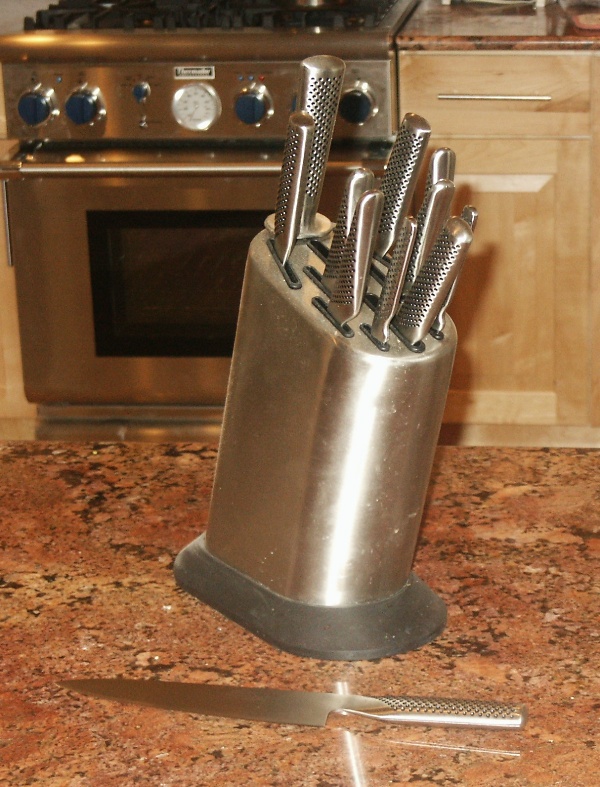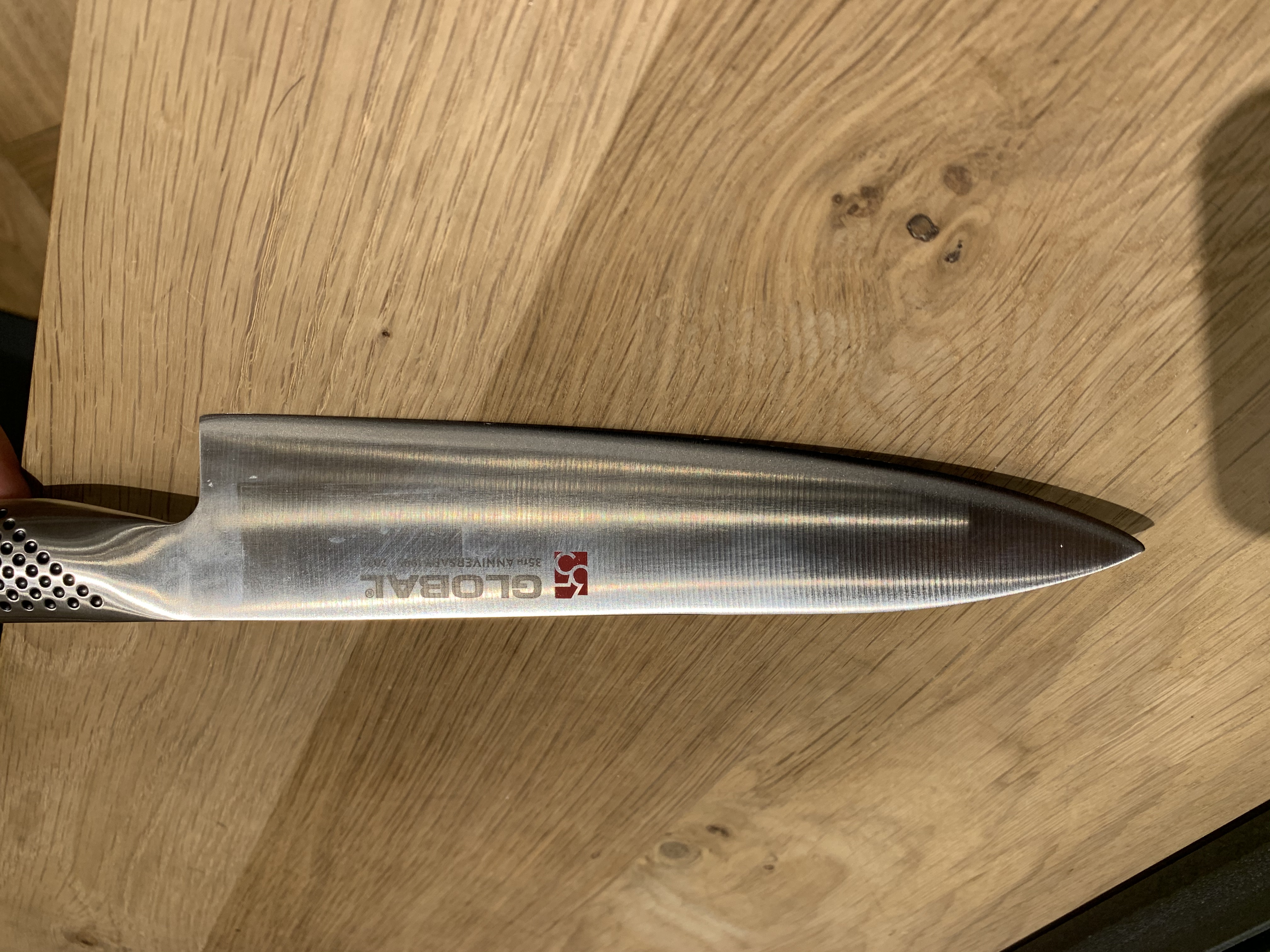Global Knives on:
[Wikipedia]
[Google]
[Amazon]
 GLOBAL is a Japanese brand of kitchen knives and accessory tools owned and manufactured by the Yoshikin factory of Japan (also known as the Yoshida Metal Industry Co. Ltd). The Yoshikin Factory is owned by the Watanabe family and located in Tsubame, Japan.
GLOBAL is a Japanese brand of kitchen knives and accessory tools owned and manufactured by the Yoshikin factory of Japan (also known as the Yoshida Metal Industry Co. Ltd). The Yoshikin Factory is owned by the Watanabe family and located in Tsubame, Japan.


 Although GLOBAL Knives appear to be one seamless piece of steel they actually consist of three different pieces that have all been carefully crafted together to give a one piece appearance. The three pieces that make up the knife are first stamped out of a sheet of CROMOVA 18 steel, the two pieces of the handle are then
Although GLOBAL Knives appear to be one seamless piece of steel they actually consist of three different pieces that have all been carefully crafted together to give a one piece appearance. The three pieces that make up the knife are first stamped out of a sheet of CROMOVA 18 steel, the two pieces of the handle are then
Official website in the United Kingdom
{{Knives Kitchen knife brands Japanese brands Knife manufacturing companies
 GLOBAL is a Japanese brand of kitchen knives and accessory tools owned and manufactured by the Yoshikin factory of Japan (also known as the Yoshida Metal Industry Co. Ltd). The Yoshikin Factory is owned by the Watanabe family and located in Tsubame, Japan.
GLOBAL is a Japanese brand of kitchen knives and accessory tools owned and manufactured by the Yoshikin factory of Japan (also known as the Yoshida Metal Industry Co. Ltd). The Yoshikin Factory is owned by the Watanabe family and located in Tsubame, Japan.
History
Yoshida Metal Industry Co. Ltd. was established in 1954 as a western tableware manufacturer in Niigata prefecture, producing hollow handled table knives for Western markets. In 1960 Yoshikin introduced the Bunmei series of knives, traditional Japanese-looking knives that used a new alloy steel, able to be sharpened likecarbon steel
Carbon steel is a steel with carbon content from about 0.05 up to 2.1 percent by weight. The definition of carbon steel from the American Iron and Steel Institute (AISI) states:
* no minimum content is specified or required for chromium, cobalt ...
, but with a mixture of molybdenum
Molybdenum is a chemical element with the symbol Mo and atomic number 42 which is located in period 5 and group 6. The name is from Neo-Latin ''molybdaenum'', which is based on Ancient Greek ', meaning lead, since its ores were confused with lea ...
and vanadium
Vanadium is a chemical element with the symbol V and atomic number 23. It is a hard, silvery-grey, malleable transition metal. The elemental metal is rarely found in nature, but once isolated artificially, the formation of an oxide layer ( pas ...
that made the steel more resistant to rust (now known colloquially as Japanese steel). In 1983, Yoshikin hired a Japanese industrial designer, Komin Yamada, to create a knife design that combined these two manufacturing techniques. GLOBAL began its international expansion under Yuzo Watanabe in Japan in 1985.
In 2006, the G Series knives were placed #46 on the Japanesque Modern Committee listing. In the years since GLOBAL has continued to come out with new lines of knives including the SAI line, the UKON line and most recently the GLOBAL NI line in 2015. Currently, the GLOBAL NI line is the most recent line of knives released for sale to the public.
Features
Compared to conventional European knives such asJ. A. Henckels
Zwilling J. A. Henckels AG is a German knife-maker based in Solingen, Germany. It is one of the largest and oldest manufacturers of kitchen knives for domestic and professional use, having been founded in June 1731 by Peter Henckels. It is also ...
or Wüsthof, GLOBAL knives are made from a significantly harder alloy of steel and use a thinner blade. In addition, the cutting edge of the blades are ground at a more shallow 15° angle, which produces a sharper knife that also hold its edge for longer and allows for more accurate work. The one drawback of this design however is that when the blade does dull it take longer to regain that same quality of edge through sharpening. Because of this, the manufacturer recommends using whetstones and ceramic sharpening rods as opposed to the European sharpening steel.
GLOBAL knives have black dimples on the handle and on one model of their knife block. The black dimples found on the handle serve mainly an aesthetic purpose however are also intended to increase the amount of grip the user is able to get on the knife.
The company subsequently introduced specialized knife designs, including a tomato knife and a crab/lobster knife. They also make eating utensils.
GLOBAL knives are used by professional chef
A chef is a trained professional cook and tradesman who is proficient in all aspects of food preparation, often focusing on a particular cuisine. The word "chef" is derived from the term ''chef de cuisine'' (), the director or head of a kitche ...
s including Anthony Bourdain
Anthony Michael Bourdain (; June 25, 1956 – June 8, 2018) was an American celebrity chef, author, and travel documentarian who starred in programs focusing on the exploration of international culture, cuisine, and the human condition. Bourdai ...
, Ludo Lefebvre and Michel Roux Jr.
Construction


 Although GLOBAL Knives appear to be one seamless piece of steel they actually consist of three different pieces that have all been carefully crafted together to give a one piece appearance. The three pieces that make up the knife are first stamped out of a sheet of CROMOVA 18 steel, the two pieces of the handle are then
Although GLOBAL Knives appear to be one seamless piece of steel they actually consist of three different pieces that have all been carefully crafted together to give a one piece appearance. The three pieces that make up the knife are first stamped out of a sheet of CROMOVA 18 steel, the two pieces of the handle are then TIG welded
Gas tungsten arc welding (GTAW), also known as tungsten inert gas (TIG) welding, is an arc welding process that uses a non-consumable tungsten electrode to produce the weld. The weld area and electrode are protected from oxidation or other atmo ...
together. While after attaching the two pieces of handle together leaves the center hollow, it doesn't stay that way for long, each handle is then injected with fine grain sand to add weight and balance to the knife.
References
External links
*Official website in the United Kingdom
{{Knives Kitchen knife brands Japanese brands Knife manufacturing companies